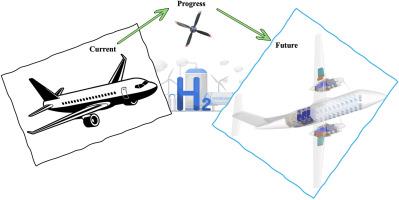案例分析:氢动力喷气发动机的当前挑战和未来方向
IF 8.3
2区 工程技术
Q1 CHEMISTRY, PHYSICAL
引用次数: 0
摘要
近年来,可持续航空的概念在航空领域取得了重大突破。氢是替代燃料中备受关注的一种,它将帮助各国实现减排和可持续发展目标。为了确保航空部门的可持续性,使用氢基技术将是不可避免的。本文综述了氢动力喷气发动机发展面临的挑战和最新技术。为了实现2015年《巴黎协定》的可持续发展目标,世界必须减少二氧化碳(CO2)排放,将全球气温与工业革命前的水平相比保持在2摄氏度以下。实现绿色航空业的一个解决方案是用液化氢(LH2)取代传统的航空燃料,如Jet a。从1954年到2025年,研究了氢作为航空燃料的历史,以及氮氧化物(NOx)排放、绿色制氢、燃烧、氢储存和氢脆等各种挑战。对与氢动力喷气发动机发展有关的研究进行了回顾;研究了氢环境下可持续制氢、基础设施、储氢罐以及等原子合金延展性和强度的提高等方面的进展。最后,讨论了飞机设计和混合动力-氢喷气发动机领域的最新进展。这篇综述的结论是,虽然氢动力喷气发动机是一项新兴技术,但对于21世纪中期的飞机来说,这是一种很有前途的燃料。本文章由计算机程序翻译,如有差异,请以英文原文为准。

A case analysis: Current challenges and future directions for hydrogen-powered jet engines
In recent years, significant breakthroughs have been made in the aviation sector with the concept of sustainable aviation. Hydrogen is of great interest among alternative fuels that will help countries achieve their emission reduction and sustainable targets. The use of hydrogen-based technologies will be inevitable to ensure sustainability in the aviation sector. This review summarizes the challenges and recent technologies associated with the development of hydrogen-powered jet engines. To meet the 2015 Paris Agreement sustainability goals, the world must reduce carbon dioxide (CO2) emissions to keep global temperatures below 2 °C from preindustrial revolution levels. One solution towards a greener aviation sector is replacing traditional aviation fuels such as Jet A with liquefied hydrogen (LH2). The history of hydrogen as an aviation fuel was investigated from 1954 to 2025, as well as the various challenges such as nitrous oxides (NOx) emissions, green hydrogen production, combustion, hydrogen storage and hydrogen embrittlement. A review of research relevant to the development of hydrogen-powered jet engines was performed; advances in sustainable hydrogen production, infrastructure, hydrogen storage tanks and the improved ductility and strength of equiatomic alloys in hydrogen environments were investigated. Finally, recent developments in the areas of aircraft design and hybrid electric-hydrogen jet engines are discussed. This review concludes that while hydrogen-powered jet engines are a nascent technology, this is a promising fuel for the aircraft of the mid-21st century.
求助全文
通过发布文献求助,成功后即可免费获取论文全文。
去求助
来源期刊

International Journal of Hydrogen Energy
工程技术-环境科学
CiteScore
13.50
自引率
25.00%
发文量
3502
审稿时长
60 days
期刊介绍:
The objective of the International Journal of Hydrogen Energy is to facilitate the exchange of new ideas, technological advancements, and research findings in the field of Hydrogen Energy among scientists and engineers worldwide. This journal showcases original research, both analytical and experimental, covering various aspects of Hydrogen Energy. These include production, storage, transmission, utilization, enabling technologies, environmental impact, economic considerations, and global perspectives on hydrogen and its carriers such as NH3, CH4, alcohols, etc.
The utilization aspect encompasses various methods such as thermochemical (combustion), photochemical, electrochemical (fuel cells), and nuclear conversion of hydrogen, hydrogen isotopes, and hydrogen carriers into thermal, mechanical, and electrical energies. The applications of these energies can be found in transportation (including aerospace), industrial, commercial, and residential sectors.
 求助内容:
求助内容: 应助结果提醒方式:
应助结果提醒方式:


